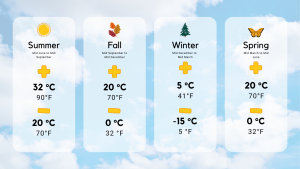Nova Scotia Climate & Culture
Climate
The Nova Scotian Climate is drastically affected by the distance to the sea, but is fairly moderate. The daily temperature will depend highly on the time of day, and the proximity to the ocean. For example Sydney Waterfront Campus, Lunenburg Campus, and Burridge Campus, will have different weather on the same day at the same time.
You can find out more about Canadian Weather at: Environment Canada web page for Nova Scotia.
The below graphic illustrates the average temperatures for each season. Please note that these temperatures are often warmer or colder with the wind, proximity to the ocean, and other geographical features of your community.

How is Summer?
- From June to August, days become warmer and warmer. You can have over +30º celsius, especially between July and August.
- Keep an eye on the wind, especially along the coast.
- Evenings can be chilly, don’t forget your sweater.
How is (early) Fall?
- September to mid-October are usually still warm.
- Leaves start changing colours and fall begins. It will get chilly towards the end of October.
- During summer and fall, Nova Scotia can be hit by hurricanes, be prepared.
How is Winter?
- Late Fall and Winter tend to be cold and wet. Daylight decreases from November and days ‘become shorter’ until about March.
- You start seeing snow from early November to late April.
- The wind chill can make you feel colder than what it really is. To keep warm, dress in layers. You can shop at local second hand stores, commonly referred to as thrift stores.
- Drink plenty of warm beverages and sleep between 7-9 hours.
- Talk to your doctor or pharmacist if you feel very tired, you might need some supplements or vitamins to help you cope with winter.
- In winter, be prepared for snow storms and severe snowstorms (known as blizzards).
How is Spring?
- Starting in March on ‘days become longer’ and birds start singing.
- It can rain a lot in April and May. The snow goes away, and you will start seeing green grass and flowers (usually from May).
- Keep dressing in layers and be prepared for some cold, wet days.
Winter Clothing
It will be important to have clothing that reflects the seasons. When you come to Nova Scotia in September, most stores will carry fall jackets. These may look warm, and are good for moderate Fall Temperatures, but will not keep you warm enough in colder winter temperatures.
You will need to ensure you buy a winter jacket that has the proper temperature rating. Temperature ratings are often associated with winter jackets and help people know what jacket will be best for you.
You will need to ensure you have waterproof and insulated footwear.
Suggested Reading
Nova Scotia Culture
There are four primary languages recognized in Nova Scotia: English, French, Gaelic, and Mi’kmaw. Most of the population in Nova Scotia speaks English.
On April 7, 2022, Nova Scotia Legislation recognized Mi’kmaw as the official first language of the province. Mi’kmaw is the language of the Mi’kmaq Nation, the First Peoples in Nova Scotia. This is significant, as the Truth and Reconciliation Commission called for Aboriginal Language Legislation to be enacted to support reconciliation in Canada.
Communities with historic Acadian (French Canadian) roots, speak French.
In Cape Breton, there is a community of people who speak Gaelic, with many of the road signs being bilingual in English and Gaelic. Gaelic is a Celtic Language from Scotland[2].
Nova Scotia is growing in diversity and has many cultures. In Halifax alone has had individuals from over 168 different countries settle in the city. In 2019, New Immigrants made up for 5.6% of the population in the Halifax Regional Municipality.
The language of the Mi'kmaq people

